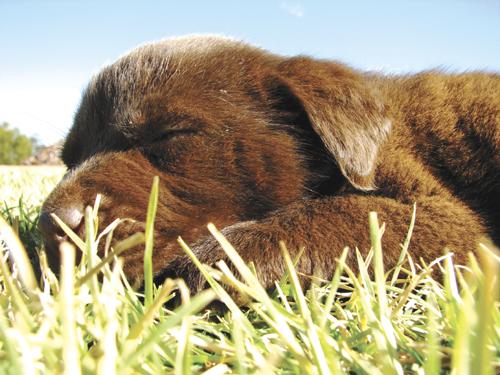Phuket Pets: Mommy, I want the cute puppy

PHUKET: By the time you bring your new puppy home, say at eight weeks of age, it should already be accustomed to an indoor domestic environment (especially one with noises) and well-socialized with people. Similarly, house training, chew toy training, and tutoring in basic manners should be well underway.
If not, your prospective puppy’s social and mental development is already severely at risk, and sadly, you could be playing catch-up for the rest of their life.
Make absolutely certain your new puppy has been raised indoors in close contact with people who have devoted lots of time to its education.
If your dog is expected to live in a household with people, obviously it needs to have been raised in a household with people.
Your puppy will need to be prepared for the clamor of everyday domestic living: the noise of the vacuum cleaner, pots and pans dropping in the kitchen, children crying, and passing motorbikes.
Exposure to such stimuli, while its eyes and ears are still developing, allows the puppy (with her blurred vision and muffled hearing) to gradually become accustomed to sights and sounds that might otherwise frighten it when older.
There is not much point in choosing a puppy that has been raised in the relative social isolation of a backyard or kennel, where there is precious little opportunity for actual interaction with people and where a puppy has become accustomed to soiling her living area and yapping a lot. Puppies raised in physical seclusion and partial social isolation are hardly prepared for household living, and they are certainly not prepared for
encounters with children.
Look for litters born and raised indoors – in a kitchen or living room. If you want a companion dog to share your home, it obviously should have been raised in a home, not a cage. If they’ve just been raised in a market cage, look elsewhere. “My dogs need socialization” is one of the more common phrases we hear from dog owners – however, this incredibly important phase in a dog’s life is essentially from the age of 6 to 10 weeks.
So, if you’ve just adopted a five month old street dog, you have missed the boat.
Selecting the right puppy
Your prospective puppy should feel thoroughly at ease being handled by strangers – you and your family. The puppy should be fully desensitized to sounds before he is four weeks old.
Likewise, his house training program should be well underway, his favorite toy should be a chew toy (stuffed with puppy chow), and he should happily and eagerly come, follow, sit, lie down, and roll over when requested. If these are not so, either your puppy is a slow learner or he has had a poor teacher. In either case, look elsewhere.
An essential ingredient of puppy husbandry is regular (several times a day) handling, gentling, and calming by a wide variety of people, especially children, men, and strangers.
These exercises are especially important during the early weeks and especially with those breeds that are notoriously tricky when handled by strangers – that is, several Asian breeds, plus many herding, working and terrier breeds: in other words, most breeds of dog.
The second most important quality in any dog is that that it can calmly interact with people, and be handled by all people, particularly children and veterinarians.
Early socialization easily prevents serious adult problems. Please remember, the single most important quality for a dog is to develop bite inhibition and a soft mouth during puppy hood.
Handling and gentling
If you want a cuddly adult dog, he needs to have been cuddled regularly as a puppy. Certainly, neonatal pups are pretty fragile and helpless critters; they can barely walk and they have a number of sensory constraints. But they still need to be socialized.
Neonatal pups are extremely sensitive and impressionable, and this is the very best time to accustom them to being handled and to outside distractions. Neonatal puppies may not see or hear very well, but they can smell and feel.
Of course, neonatal, and also initial puppy socialization, being of paramount importance, must be done gently and carefully.
Questions
Ask the breeder how many people have handled, gentled and trained the pups daily.
Specifically, ask the breeder how many children, men, and strangers have worked with the puppies.
Handle each puppy to see how it enjoys being cuddled (gently restrained); specifically, see how it enjoys being stroked and massaged (examined) around his neck, muzzle, ears, paws, belly, and rear end.
For more information contact the Thailand Canine Academy on: 089 588 4050, or send an email to canineworld@icloud.com.
— The Dog Whisperer
Latest Thailand News
Follow The Thaiger on Google News:


























